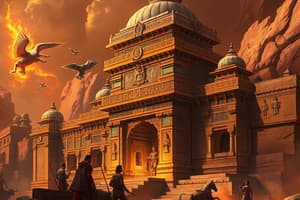Podcast
Questions and Answers
Who assisted the emperor in the central government?
Who assisted the emperor in the central government?
- Tax collectors
- Military commanders
- Brahmagarbas (correct)
- Regional governors
What was the primary source of revenue for the Gupta Empire?
What was the primary source of revenue for the Gupta Empire?
- Military conquests
- Agricultural produce (correct)
- Taxation on infrastructure
- Trade and commerce
What was the role of the regional governors in the Gupta Empire?
What was the role of the regional governors in the Gupta Empire?
- To advise the emperor on religious matters
- To maintain law and order, collect taxes, and supervise the military (correct)
- To construct new roads and bridges
- To supervise the military
Who had the final authority in all matters of state in the Gupta Empire?
Who had the final authority in all matters of state in the Gupta Empire?
Who did the emperor appoint to oversee the administration of provinces?
Who did the emperor appoint to oversee the administration of provinces?
What was the characteristic of the Gupta Empire's administration?
What was the characteristic of the Gupta Empire's administration?
What was the primary responsibility of local officials in the Gupta Empire?
What was the primary responsibility of local officials in the Gupta Empire?
What was the primary role of the military in the Gupta Empire?
What was the primary role of the military in the Gupta Empire?
Who was often a patron of scholarship and supported research in the Gupta Empire?
Who was often a patron of scholarship and supported research in the Gupta Empire?
What was the characteristic of the Gupta Empire's administration?
What was the characteristic of the Gupta Empire's administration?
Who were responsible for overseeing the administration of provinces in the Gupta Empire?
Who were responsible for overseeing the administration of provinces in the Gupta Empire?
What was highly valued in the Gupta Empire?
What was highly valued in the Gupta Empire?
Flashcards are hidden until you start studying
Study Notes
Gupta Empire Administration
The Gupta Empire, which lasted from the early fourth century CE to the late sixth century CE, was known for its efficient governance and bureaucracy. The empire's administration was characterized by a centralized system, with the emperor at the helm, and regional governors overseeing provinces.
Centralized Administration
The central government was responsible for maintaining law and order, collecting taxes, and supervising the military. The emperor was assisted by a council of advisors, known as the "Brahmagarbas," who were often Brahmin scholars. They provided advice on religious matters, law, and administration. The emperor had the power to appoint and remove governors, and he was the final authority in all matters of state.
Regional Governors
Governors were appointed by the emperor to oversee the administration of provinces. They were responsible for maintaining law and order, collecting taxes, and supervising the military. Governors were often from the ruling family or were chosen for their administrative skills. They were responsible for maintaining the empire's infrastructure, such as roads, bridges, and water supply systems.
Taxation
The Gupta Empire had a well-organized system of taxation. Land was the primary source of revenue, and taxes were levied on agricultural produce. The emperor also had the power to impose taxes on trade and commerce. Taxes were collected by local officials, who were responsible for ensuring that they were paid on time.
Military
The Gupta Empire had a well-trained and disciplined military. Soldiers were recruited from the upper castes, and they were trained in the use of weapons and tactics. The military was responsible for defending the empire from external threats and maintaining law and order within the empire.
Education and Scholarship
The Gupta Empire was known for its scholars and scientists. Education was highly valued, and there were many schools and universities throughout the empire. Scholars were encouraged to conduct research in various fields, such as mathematics, astronomy, and medicine. The emperor himself was often a patron of scholarship and supported scholars and their research.
In conclusion, the Gupta Empire's administration was characterized by a centralized system with an efficient bureaucracy. The emperor was assisted by a council of advisors, and regional governors oversaw the administration of provinces. The empire had a well-organized system of taxation, a well-trained military, and a strong emphasis on education and scholarship.
Studying That Suits You
Use AI to generate personalized quizzes and flashcards to suit your learning preferences.




